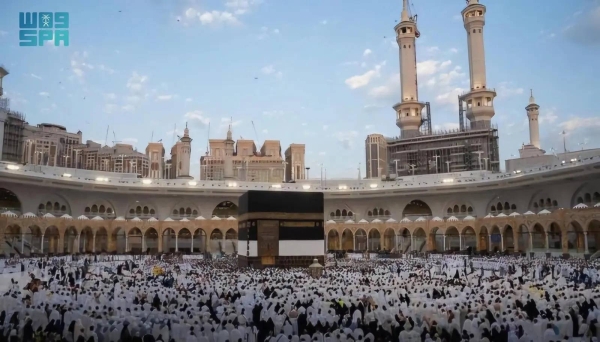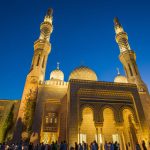On Monday, citizens, residents, and visitors from all over Saudi Arabia came together to perform the Eid Al-Adha prayer. Mosques were bustling with worshippers who had gathered in the early hours of the morning to engage in this important religious ritual. Meticulous preparations had been made to ensure a smooth and safe prayer experience for all participants. At the Grand Mosque, worshippers were immersed in devotion as they performed the Eid Al-Adha prayer under the leadership of Imam Sheikh Dr. Abdulrahman Al-Sudais. Al-Sudais took the opportunity to extend Eid greetings to the pilgrims and pray for their acceptance of their Hajj, recognition of their dedication, and forgiveness for any wrongdoings.
Meanwhile, worshippers also gathered at the Prophet’s Mosque to partake in the Eid Al-Adha prayer. Led by Imam Sheikh Dr. Khalid Al-Muhnna, the prayer was conducted in an atmosphere of deep spirituality and devotion. In his Eid sermon, Al-Muhnna emphasized the significance of Takbir, a declaration of the greatness of Allah that surpasses all else. The atmosphere at the prayer was one of reverence and reflection as worshippers took the time to connect with their faith and seek forgiveness for any transgressions. The Eid Al-Adha prayer is a time-honored tradition that holds immense importance in the hearts of Muslims around the world.
As the Eid Al-Adha prayer took place in various mosques across Saudi Arabia, the significance of this religious holiday was felt by all participants. The act of coming together in prayer serves as a reminder of the unity and community that is intrinsic to the Islamic faith. The prayers conducted by Imam Sheikh Dr. Abdulrahman Al-Sudais and Imam Sheikh Dr. Khalid Al-Muhnna resonated with worshippers as they sought to deepen their spiritual connection and seek forgiveness for any shortcomings. The Eid Al-Adha prayer represents a time of reflection, gratitude, and devotion for Muslims around the world.
The Eid Al-Adha prayer is not only a time for spiritual reflection but also a time for celebration and fellowship. Following the prayer, worshippers often come together to share meals, exchange gifts, and engage in acts of charity. The spirit of generosity and compassion that characterizes Eid Al-Adha is a reminder of the importance of helping those in need and building a sense of community. The holiday serves as a time for Muslims to come together with loved ones, strengthen bonds, and renew their commitment to their faith.
In addition to the spiritual significance of the Eid Al-Adha prayer, the holiday also holds cultural importance for Muslims around the world. The traditions and rituals associated with Eid Al-Adha vary across different regions and communities, but the underlying message of sacrifice, gratitude, and compassion remains the same. As worshippers gather in mosques to perform the prayer, they are reminded of the shared values and beliefs that unite them with Muslims around the world. Eid Al-Adha serves as a time to honor the traditions of the past, celebrate the present, and look towards the future with hope and faith.
In conclusion, the Eid Al-Adha prayer is a time-honored tradition that holds immense significance for Muslims around the world. The act of coming together in prayer allows worshippers to deepen their spiritual connection, seek forgiveness, and renew their commitment to their faith. The celebrations that follow the prayer serve as a time for fellowship, generosity, and community building. As Muslims gather in mosques to perform the Eid Al-Adha prayer, they are reminded of the shared values and beliefs that unite them with their fellow believers. Eid Al-Adha is not only a time for prayer and reflection but also a time for celebration, gratitude, and compassion.































